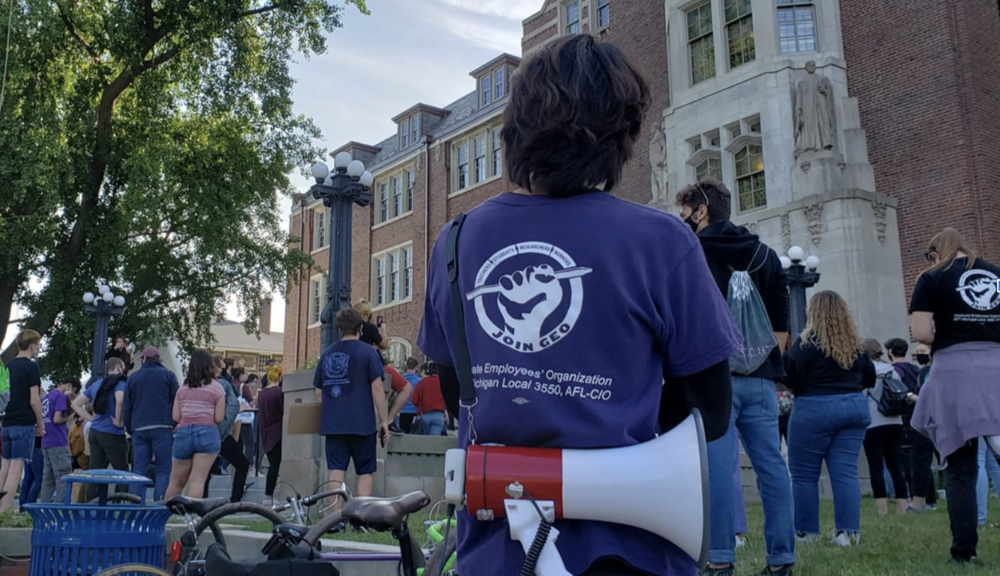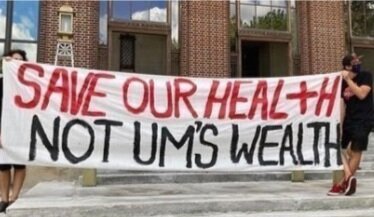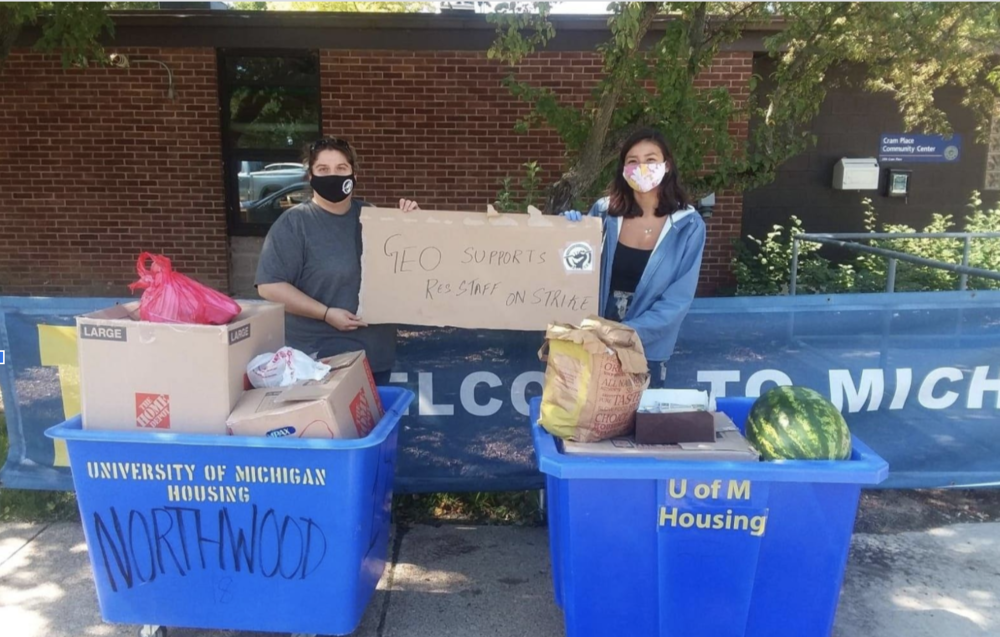Op/Ed: Lessons Learned from GEO’s Strike Last Fall
Our members have opinions about labor issues! Our Op/Ed series gives a voice to these. In this installment, we invited GEO’s (Graduate Employees’ Organization) Yeager, to share powerful lessons learned from their strike last fall.
Yeager (they/them)
Ann Arbor | Classics | PhD Student, GSI, GEO Secretary & Steward
Hi, my name is Yeager, I use they/them pronouns, and I’m a PhD student and GSI in the Classics department at Ann Arbor. The Graduate Employees’ Organization (GEO) went on strike last year for a Safe and Just Reopening, which, in our view, should have included transparent COVID policies, protections for international students and parents, and less policing.
One year ago, probably to the day, I stood on the Diag with a few hundred comrades at an open mic event and shared that I was in a union, had joined a picket line, and had gone on strike, all for the first time in my life. I said I was scared but also encouraged by everyone around me. Now I’m a GEO steward for my department, and I’m also GEO’s secretary, and I’m going to share with you the top five lessons I learned.
Number 1: A job action isn’t just a job action.
Let me go officially on record here and say that people don't go on strike because they're lazy. Union organizing and actions are some of the most labor-intensive—pun intended—things I have ever done, and I'm saying that as a PhD student who, like nearly every PhD student, is well-accustomed to overwork and underpay. The number of organizing conversations we had in GEO’s two-week strike, the volume of emails that we sent, the miles that we walked, the shear strain on our vocal chords, the time spent in late-night planning sessions, the level of stress on the people actually sitting down at the bargaining table (a virtual table, because HR didn’t want to bargain in-person in a pandemic)—all of that adds up to an incalculable amount of effort.
And yet all this work was just a drop in the bucket, because a job action isn’t just a job action. It’s the road that you take to get there and the organizing you do along the way. The real power is what you build months before, alongside seemingly-perpetual bargaining. It's in all of the texts and emails and phone calls that build a net of mutual support between coworkers. It's in the summer rallies and the open bargaining sessions, and it’s in the picket lines and the email zaps that happen for months as unionized workers show the school that they’re serious about protecting themselves and fighting for dignity. If, after all that, union members still decide to withhold their labor, I remind you that it’s not because we’re lazy. We only withhold our labor when our employers shut us out for months on end and think that problems will go away if they ignore the people pointing them out. Stated differently, the university thought that COVID wouldn’t be that big of a problem if they just ignored the concerns of unions and students - GEO members knew that that wasn’t going to be the case. The university now thinks that if it just ignores LEO, everyone will forget to care about equity for lecturers across all three campuses, or support for lecturers who are parents, or dignity for the people who teach something like half of all undergraduate student credit hours. At every step of the way, we tell them we won’t forget, and when job actions happen, it’s because they have refused to listen.
Number 2: Solidarity isn’t just a slogan - it’s what sustains us.
Before I went on strike, I knew some of my own classmates in the Classics department, and virtually no students from any other departments. But during the strike, I marched in picket lines composed entirely of members of my department. One hundred people sang happy birthday to me because we happened to be striking on my birthday. Someone in my department, whom I had never really interacted with before, even checked in with me every day to make sure I had a lunch I could actually eat. I can guarantee that I would not have made it through the strike without my Classics comrades. The strike wasn’t sunshine and roses for us—the week after I got off strike, I had an exam on material covered while I wasn’t there—but our solidarity sustained us.
But that’s true for the union as a whole as well—GEO couldn’t have won anything without the support of unionized construction and trades workers who refused to cross our picket lines at 6 in the morning. We couldn’t have persisted without the undergrads who organized their own actions in solidarity and who marched on our picket lines while the university was trying to tell them that we didn’t care about them. We quite literally couldn’t have continued marching without the support of the community and local businesses who donated food to us. I’ll pause here to note that those donations were so generous that we ourselves donated cartloads of food and supplies to undergrads who were stuck in isolation housing without access to items so basic as pillows or microwaves. And let’s not forget the entire picket line of lecturers, a line which got so large that I had to move it to a different location to fit all of the people who showed up for us. Solidarity sustained us.
Number 3: Always bring a friend, and let your friends bring you too.
In a union, we fight to leave none of our members behind. Since we were on strike for two weeks, there was a weekend in between the Friday and Monday pickets. There were some people in the Classics department whom I hadn’t seen on a picket line yet, so I checked in on them that weekend. We talked about the enormous pressure, the fear, and the uncertainty, but I did press (just a little) and tried to get them to come to just one picket shift with other people in the department. Most of those people did end up coming out to chant and wave signs and hit a cowbell when their voices gave out - and they told me that the picket line changed their relationship to the union. Before they got involved, they couldn’t see all the people that were on their side - once they were on the picket line, they got to experience the joy that makes the pressure bearable. I learned that from then on, you always invite a friend to organizing, and by that same token, you always show up for the people around you. I mentioned before that we went on strike for protections for people teaching in-person, international students, and students who were also parents. Now, none of those things affected me personally, and, I’ll be honest, some of the things on the official strike platform weren’t worded precisely how I thought they should have been. But I’m in a union, and that means that I fight for everyone, not just for myself. GEO is full of people with different identities, backgrounds, and ideas, and we’re stronger when we organize in light of those differences, not despite them, by listening to and respecting each other.
Number 4: Don’t let the university’s pressure steal your joy.
For me personally, striking was one of the hardest things I’ve ever done. I found myself teaching for the first time ever, virtually, with a professor new to this school, in a pandemic, and new to the union, having only joined at the end of the summer. I don’t know many other times in my life where I’ve been under quite that amount of pressure. It is really easy, when under that much pressure and that much uncertainty, to isolate and forget that there are people who support you. And I'll be honest, joy doesn't take away that pressure, but it makes it a little more bearable. So what do I mean by joy in a job action? Joy while striking looks like a Twitter account randomly popping up for anonymous Picket crushes. Joy in a job action looks like captains of picket lines organizing dance parties on their lines and creatively adapting chants with the people picketing. It looks like so many fun memes. Now, any time workers find joy, the bosses find a way to say that we're being irresponsible and that we’re taking the disruption lightly. They can't understand how we can face a powerful university precisely because we commit to sharing each others’ fears and burdens and in finding joy in community anyway despite the pressure. Our communal joy is also part of our power.
Number 5: Your community is bigger than you think.
I’ve sort of touched on this throughout, but I wanted to highlight this here as well. Because of our job action, I knew people in my department that I could trust to stand up for me. I made friends in other departments—people who I would have never otherwise met—who I still organize with. I’m more confident in standing up for myself and others because I know people across the university who will stand with me. And it seems like that’s something a lot of other people learned. The Students of Color Liberation Front and others tackled the incredibly ill-designed Michigan Ambassadors program, in which the university planned to use plainclothes cops and student informants to enforce COVID policies that were often unclear. ResStaff workers and MDining workers started working together and the community rallied to support them as well. While GEO was organizing for our strike, SACUA, the Faculty Senate, passed a vote of no confidence in Mark Schlissel. Although GEO held the proverbial megaphone, we weren’t the only ones shouting into it. We haven’t forgotten how powerful that shared voice was, and, as I’ve said before, the university had better listen now, before we make them listen.




